法语时态复习
法语时态总结
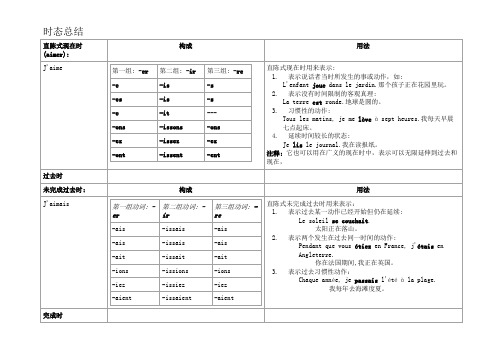
Tuavais aimé
Vousaviez aimé
Ilavait aimé
Ilsavaient aimé
不及物动词用être作助动词,形式如下:
J'étaisallé(e)
Nousétionsallé(e)s
Tuétaisallé(e)
Vousétiezallé(e)s
Nousallons voyageràBordeaux par bateau.我们将坐船去波尔多。
先将来时:
构成
用法
J'aurai aimé
先将来时是由助动词être或avoir的简单将来时形式加过去分词构成的。
及物动词用avoir作助动词,形式为:
J'aurai aimé
Nousaurons aimé
S'il neige, nous ne sortirons pas.
(现在时.........将来时)
如果下雪,我们将不出去。
S'il neige, nous ne sortons pas.
(现在时.......现在时)
如果下雪,我们不出去。
S'il neige, ne sortez pas.
(现在时......命令式)
Ileut aimé
Ilseurent aimé
不及物动词用être作助动词,形式如下:
Jefusallé(e)
Nousfûmesallé(e)s
Tufusallé(e)
Vousfûtesallé(e)s
Ilfut allé
Ilsfurentallés
它用来表示:
1.一个发生在一个过去动作之前的动作:
法语时态总结详尽版

法语时态总结详尽版(一)时态分类:现在时le prsent de 1’ indicatif将来时Le future de 1' indicatif 最近将来时Future proche 简单将来时Future simple先将来时Future antrieur未完成过去时L' imparfait de 1' indicatif 复合过去时Le pass compos de 1’ indicatif 愈过去时Le plus-que-parfait de 1' indicatif 条件式Le conditionnel (prsent/pass)虚拟式Le subjonctif (prsent/pass/imparfa it /plus - que- parfait)被动态La forme passive先过去时Pass antrieur简单过去时Pass simple正在进行时Prsent progressif最近过去时Pass rcent 一、现在时:描写发生的动作或状态/表达习惯性动作/描述真理例:j‘ cris un article Aimer Finir II a mal 1’ estomac J" aime Je finis Ma mre va au bureau7h du matin Tu aimes Tu finisL‘ eau boutlOOc Il/elle aime Il/elle finit J" arrive tout de suit Nous aimons Nous finissons Vous aimez Vous finissezIls/elles aiment Ils/elles finissent 动词分组:第一组(~er) 第二组(-ir)第三组(-re)二、简单将来时动词变化:tU rasrarezront 结尾Etre Avoir Je serai J' aurai Tu seras Tu auras Il/elle sera Il/elle aura Nous serons Nous aurons Vous serez Vous aurez Ils/elles seront Ils/elles auront 例:Demain j T irai au cinma> Elie sera ici dema订、三、最近过去时四、最近将来时表达刚刚结束的动作Aller+动词原形Venir de +动词原形Je vais aller au cinma、我将要去电影院Je viens de partir.我刚刚走五、未完成过去时动词变化:以-aisait iez -alient - aient结尾表达过去描写的背景/环境/人物未完成过去时主要表达/描写/叙述/事情表达过去发生的习惯性动作Hier martin,订faisait mauvais, le ciel tait nuageux昨天早上天气很坏,乌云密布Quand j, tais paris ,je me promenais tout les jours au bord de la Seine.当我在巴黎的时候,每天我都去河边散步比较最近将来时未完成过去时最近过去时IL est sept heurts, le match va finir、现在七点,比赛马上结束IL tait sept heurts le match allais finir、那时是7点,比赛马上结束Ma f ille est contente, elle vie ns de recevoir un ceideau、我女儿很高兴,他刚刚收到一个礼物Ma fille tais contente ,elle venait de recevoir un cadeau我女儿那时很高兴,他刚收到一个礼物六、复合过去时表示已经结束的动作动词变化tre(avoir) + 过去分词II est sorti 他出去了Elle a dmenag他已经搬家了 Etre 做助动词用于 venir partir entrer montre tombre sortir 等注以se 形式的自反动词也有四种词尾:-iselle parcouru la lettre qu" elle poussa un cri de joie 、、条件式过去时1、构成:2、avoir (条件式现在时)+过去分词:j' aurais paritre je serais all (e )parler allerj' aurais pari nous aurions pari je serais all (e )nous serions alls (es )tu aurais pari vous auriezpari tu serais all (e )vous seriez all (e )(s )(es ) il aurait pari ils auraient pari il serait all ils seraient allselle aurait pari elles auraient pari elle serait alle elles seraient alles se leverje me serais lev (e )nous nous serions levs (es )tu te serais lev (e )vous vous seriez lev (e )(S )(es ) il se serait lev ils se seraient levselle se serait desendre reste 用tre 做助动词 剩下用avoir 做助动词第一组动词 将词尾-er 换成- parler pari第二组动词 将词尾-ir 换成-i finir fini第三组动词leve elles se seraient leves2、用法:用在表示结果的主句中,条件从句由si引导,其谓语用直陈式愈过去时;表示可能实现实际未实现,相当于英语中的虚拟。
法语时态总结
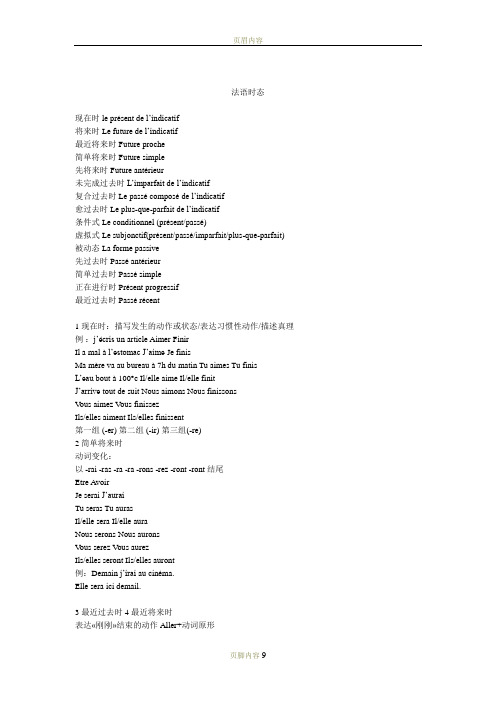
法语时态现在时 le présent de l’indicatif将来时 Le future de l’indicatif最近将来时 Future proche简单将来时 Future simple先将来时 Future antérieur未完成过去时L’imparfait de l’indicatif复合过去时 Le passé composé de l’indicatif愈过去时 Le plus-que-parfait de l’indicatif条件式 Le conditionnel (présent/passé)虚拟式 Le subjonctif(présent/passé/imparfait/plus-que-parfait) 被动态 La forme passive先过去时 Passé antérieur简单过去时 Passé simple正在进行时 Présent progressif最近过去时 Passé récent1 现在时:描写发生的动作或状态/表达习惯性动作/描述真理例:j’écris un article Aimer FinirIl a mal àl’estomac J’aime Je finisMa mère va au bureau à 7h du matin Tu aimes Tu finisL’eau bout à 100°c Il/elle aime Il/elle finitJ’arrive tout de suit Nous aimons Nous finissonsV ous aimez V ous finissezIls/elles aiment Ils/elles finissent第一组 (-er) 第二组 (-ir) 第三组(-re)2简单将来时动词变化:以 -rai -ras -ra -ra -rons -rez -ront -ront 结尾Etre AvoirJe serai J’auraiTu seras Tu aurasIl/elle sera Il/elle auraNous serons Nous auronsV ous serez V ous aurezIls/elles seront Ils/elles auront例:Demain j’irai au cinéma.Elle sera ici demail.3 最近过去时4 最近将来时表达«刚刚»结束的动作 Aller+动词原形Venir de +动词原形 Je vais aller au cinéma.我将要去电影院Je viens de partir.我刚刚走5 未完成过去时动词变化:以-ais -ais -ait -ait –ions- iez –aient –aient结尾表达过去描写的背景/ 环境 /人物未完成过去时主要表达/描写 /叙述/事情表达过去发生的习惯性动作Hier martin ,il faisait mauvais, le ciel était nuageux.昨天早上天气很坏,乌云密布Quand j’étais à paris ,je me promenais tout les jours au bord de la Seine.当我在巴黎的时候,每天我都去河边散步比较最近将来时未完成过去时最近过去时IL est sept heurts, le match va finir. 现在七点比赛马上结束IL était sept heurts le match allais finir. 那时是7点比赛马上结束Ma fille est contente, elle viens de recevoir un cadeau.我女儿很高兴,他刚刚收到一个礼物Ma fille étais contente , elle venait de recevoir un cadeau.我女儿那时很高兴,他刚收到一个礼物6 复合过去时动词变化 être(avoir)+过去分词表示已经结束的动作Il est sorti 他出去了Elle a démenagé他已经搬家了Etre做助动词用于 venir partir entrer montre desendre reste tombre sortir等注以se 形式的自反动词也用être做助动词剩下用avoir做助动词第一组动词将词尾-er换成-é parler parlé第二组动词将词尾-ir换成-i finir fini第三组动词有四种词尾:-i -u -s -t sortirrépondremettredire sortirépondumisdit有些第三组动词过去分词:avoir euêtre étéfaire faitlire lu attendre attenduentendre entenduconnaître connuvouloir voulupouvoir p usavoir suvoir vubire bufalloir fallupleuvoir pluprendre priscomprendre comprisecrire écritBien, déjà, beaucoup, encore等副词放在助动词与过去分词之间。
法语语法时态复习归纳
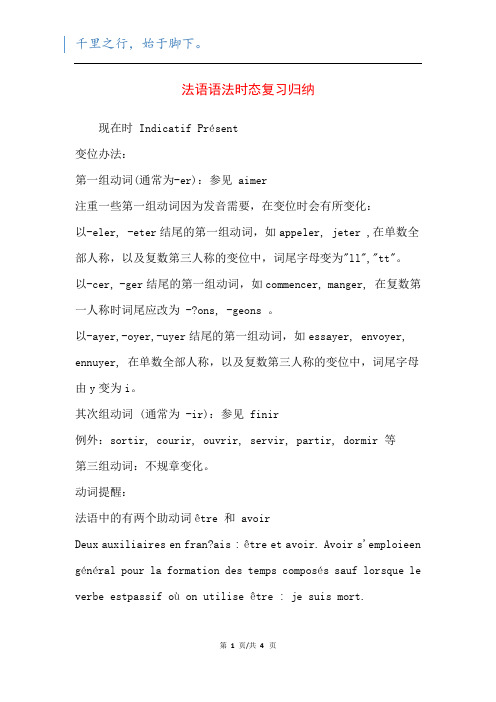
法语语法时态复习归纳现在时Indicatif Présent变位办法:第一组动词(通常为-er):参见 aimer注重一些第一组动词因为发音需要,在变位时会有所变化:以-eler, -eter结尾的第一组动词,如appeler, jeter ,在单数全部人称,以及复数第三人称的变位中,词尾字母变为"ll","tt"。
以-cer, -ger结尾的第一组动词,如commencer, manger, 在复数第一人称时词尾应改为 -?ons, -geons 。
以-ayer,-oyer,-uyer结尾的第一组动词,如essayer, envoyer, ennuyer, 在单数全部人称,以及复数第三人称的变位中,词尾字母由y变为i。
其次组动词 (通常为 -ir):参见 finir例外:sortir, courir, ouvrir, servir, partir, dormir 等第三组动词:不规章变化。
动词提醒:法语中的有两个助动词être 和 avoirDeux auxiliaires en fran?ais : être et avoir. Avoir s'emploieen général pour la formation des temps composés sauf lorsque le verbe estpassif où on utilise être : je suis mort.变位提醒:直陈式复合过去时(Indicatif Passé Composé)用于表示过去已经完成的动作或某一已经完成的动作是发生在多少时光内的。
Ex:Il est sorti.Il a travaillé toute l'après-midi.变位办法:由助动词avoir或être的直陈式现在时加上动词的过去分词。
法语时态总结

法语时态总结时态分类:现在时le present de l’indicatif将来时Le future de l’indicatif最近将来时Future proche简单将来时Future simple先将来时Future anterieur未完成过去时L’imparfait de l’indicatif复合过去时Le passecomposede l’indicatif愈过去时Le plus-que-parfait de l’indicatif条件式Le conditionnel(present/passe)虚拟式Le subjonctif(present/passe/imparfait/plus-que-parfait)被动态La forme passive先过去时Passeanterieur简单过去时Passesimple正在进行时Present progressif最近过去时Passerecent一.现在时:描写发生的动作或状态/表达习惯性动作/描述真理例:j’ecris un article Aimer FinirIl a malal’estomac J’aime Je finisMa mere va au bureaua7h du matin Tu aimes Tu finisL’eau bouta100°c Il/elle aime Il/elle finitJ’arrive tout de suit Nous aimons Nous finissonsVous aimez Vous finissezIls/elles aiment Ils/elles finissent动词分组:第一组(-er)第二组(-ir)第三组(-re)二.简单将来时动词变化:以-rai-ras-ra-ra-rons-rez-ront-ront结尾Etre AvoirJe serai J’auraiTu seras Tu aurasIl/elle sera Il/elle auraNous serons Nous auronsVous serez Vous aurezIls/elles seront Ils/elles auront例:Demain j’irai au cinema.Elle sera ici demail.三.最近过去时四.最近将来时表达刚刚结束的动作Aller+动词原形Venir de+动词原形Je vais aller au cinema.我将要去电影院Je viens de partir.我刚刚走五.未完成过去时动词变化:以-ais-ais-ait-ait–ions-iez–aient–aient结尾表达过去描写的背景/环境/人物未完成过去时主要表达/描写/叙述/事情表达过去发生的习惯性动作Hier martin,il faisait mauvais,le cieletait nuageux.昨天早上天气很坏,乌云密布Quand j’etaisaparis,je me promenais tout les jours au bord de la Seine.当我在巴黎的时候,每天我都去河边散步比较最近将来时未完成过去时最近过去时IL est sept heurts,le match va finir.现在七点比赛马上结束ILetait sept heurts le match allais finir.那时是7点比赛马上结束Ma fille est contente,elle viens de recevoir un cadeau.我女儿很高兴,他刚刚收到一个礼物Ma filleetais contente,elle venait de recevoir un cadeau.我女儿那时很高兴,他刚收到一个礼物六.复合过去时表示已经结束的动作动词变化etre(avoir)+过去分词Il est sorti他出去了Elle a demenage他已经搬家了Etre做助动词用于venir partir entrer montre desendre reste tombre sortir等注以se形式的自反动词也用etre做助动词剩下用avoir做助动词第一组动词将词尾-er换成-eparler parle第二组动词将词尾-ir换成-i finir fini第三组动词有四种词尾:-i-u-s-t sortirrepondremettredire sortirepondumisdit有些第三组动词过去分词:avoir euetreetefaire faitlire lu attendre attenduentendre entenduconnaître connuvouloir voulupouvoir pusavoir suvoir vubire bufalloir fallupleuvoir pluprendre priscomprendre comprisecrireecritBien,deja,beaucoup,encore等副词放在助动词与过去分词之间。
法语时态用法及变位汇总表复习课程

现在分词(le participe présent)
构成
直陈式现在时第一人称复数去掉词尾-ons,换上-ant。
动词变位
直陈式现在时第一人称复数去掉词尾-ons,换上-ant。
三个例外的动词:avoir—ayant;être—étant;savoir—sachant
4)表示主动意义。
副动词(le gérondif)
构成
en + 现在分词(无词形变化)
动词变位
现在分词
用法
用作谓语的状语,相当于英语中作状语的现在分词短语。
1)作时间状语:
2)作条件、假设状语:
说明
1)副动词的主语只能是句子的主语,而现在分词可以有自己的主语;
2)副动词一般做时间或条件状语,而现在分词还可做原因状语;
2、简单将来时le Байду номын сангаасutur simple
构成
原形动词进行相应变位。
动词变位
第一组/第二组:原形动词后直接加–ai、-as、-a、-a、-ons、-ez、-ont、-ont 结尾;
第三组:以-re结尾的,去掉-e再加这些词尾;
其他动词词根有变化,但仍用这些词尾。
用法
表达将来发生的动作或出现的状态。
因为是连锁店,老板的“野心”是开到便利店那样随处可见。所以办了积分卡,方便女孩子到任何一家“漂亮女生”购物,以求便宜再便宜。être或avoir的现在分词
年轻有活力是我们最大的本钱。我们这个自己动手做的小店,就应该与时尚打交道,要有独特的新颖性,这正是我们年轻女孩的优势。用法
(2) 文化优势(类似英语的现在分词完成式)实际上是现在分词的过去式,用法与现在分词基本同,只是时态不同:现在分词表示和主要动词同时发生的动作;复合过去分词表示在主要动词之前已经完成的动作。
法语时态总结详尽版
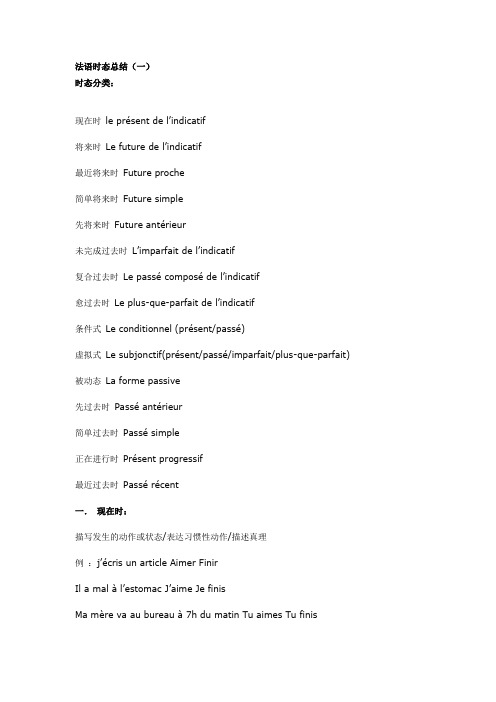
法语时态总结(一)时态分类:现在时le présent de l’indicatif将来时Le future de l’indicatif最近将来时Future proche简单将来时Future simple先将来时Future antérieur未完成过去时L’imparfait de l’indicatif复合过去时Le passé composé de l’indicatif愈过去时Le plus-que-parfait de l’i ndicatif条件式Le conditionnel (présent/passé)虚拟式Le subjonctif(présent/passé/imparfait/plus-que-parfait) 被动态La forme passive先过去时Passé antérieur简单过去时Passé simple正在进行时Présent progressif最近过去时Passé récent一.现在时:描写发生的动作或状态/表达习惯性动作/描述真理例:j’écris un article Aimer FinirIl a mal à l’estomac J’aime Je finisMa mère va au bureau à 7h du matin Tu aimes Tu finisL’eau bout à 100°c Il/elle aime Il/elle finitJ’arrive tout de suit Nous aimons Nous finissonsVous aimez Vous finissezIls/elles aiment Ils/elles finissent动词分组:第一组(-er) 第二组(-ir) 第三组(-re)二.简单将来时动词变化:以-rai -ras -ra -ra -rons -rez -ront -ront 结尾Etre AvoirJe serai J’auraiTu seras Tu aurasIl/elle sera Il/elle auraNous serons Nous auronsVous serez Vous aurezIls/elles seront Ils/elles auront例:Demain j’irai au cinéma.Elle sera ici demail.三.最近过去时四.最近将来时表达刚刚结束的动作Aller+动词原形Venir de +动词原形Je vais aller au cinéma.我将要去电影院Je viens de partir.我刚刚走五.未完成过去时动词变化:以-ais -ais -ait -ait –ions- iez –aient –aient结尾表达过去描写的背景/ 环境/人物未完成过去时主要表达/描写/叙述/事情表达过去发生的习惯性动作Hier martin ,il faisait mauvais, le ciel était nuageux.昨天早上天气很坏,乌云密布Quand j’étais à paris ,je me promenais tout les jours au bord de la Seine.当我在巴黎的时候,每天我都去河边散步比较最近将来时未完成过去时最近过去时IL est sept heurts, le match va finir. 现在七点,比赛马上结束IL était sept heurts le match allais finir. 那时是7点,比赛马上结束Ma fille est contente, elle viens de recevoir un cadeau.我女儿很高兴,他刚刚收到一个礼物Ma fille étais contente , elle venait de recevoir un cadeau.我女儿那时很高兴,他刚收到一个礼物六.复合过去时表示已经结束的动作动词变化être(avoir)+过去分词Il est sorti 他出去了Elle a démenagé他已经搬家了Etre做助动词用于venir partir entrer montre desendre reste tombre sortir等注以se 形式的自反动词也用être做助动词剩下用avoir做助动词第一组动词将词尾-er换成-é parler parlé第二组动词将词尾-ir换成-i finir fini第三组动词有四种词尾:-i -u -s -t sortirrépondremettredire sortirépondumisdit有些第三组动词过去分词:avoir euêtre étéfaire faitlire luattendre attenduentendre entenduconnaître connuvouloir voulupouvoir pusavoir suvoir vuboire bufalloir fallupleuvoir pluprendre priscomprendre comprisecrire écritBien, déjà, beaucoup, encore等副词放在助动词与过去分词之间。
法语时态总结

I.现在时动词变位1.以-er结尾的不定式词干+-e, -es, -e, -ons, -ez, -ent, 如chanter : je chante, tu chantes, il chante, elle chante, nous chantons, vous chantez, ils chantent, elles chantent特例:a)以-ger结尾的动词:Voyager : nous voyageonsb)以-cer结尾的动词:commencer : nous commençonsc)以-eler结尾的动词:appeler : j’appelle, tu appelles, il appelle, nous appelons,vous appelez, ils appellentd)以-eter结尾的动词:Jeter : je jette, tu jettes, il jette, nous jetons, vous jetez, ilsjettente)在倒数第二个音节有-e或-é的动词:-e/-é变成è,如:Peser : je pèse, tu pèses, il pèse, nous pesons, vous pesez, ils pèsentEspérer : j’espère, tu espères, il espère, nous espérons, vous espérez, ils espèrent f)以-oyer, -uyer, -ayer结尾的动词,在哑音-e前,y变成-i , 如:Nettoyer : je nettoie, tu nettoies, il nettoie, nous nettoyons, vous nettoyez, ils nettoient2. 第二组动词:以-ir结尾的不定式词干+-is, -is, -it, -issons, -issez, -issent, 如 : Finir : je finis, tu finis, il finit, elle finit, nous finissons, vous finissez, ils finissent, elles finissent.3.第三组动词变位:不规则动词变位必须熟记avoir, être,因为符合过去式的构成都与他们有关,其他的动词,在每一类中选择一个加以背诵,可以取到举一反三的作用。
法语语法时态复习归纳(French grammar, tense, review, inductio

法语语法时态复习归纳(French grammar, tense, review,induction)现在时 present indicative变位方法.第一组动词 (通常为.): 参见 love注意一些第一组动词由于发音需要, 在变位时会有所变化.以 - outside, eter结尾的第一组动词, 如appeler, throw, 在单数所有人称, 以及复数第三人称的变位中, 词尾字母变为 "he", "tt".以 (, ger结尾的第一组动词, 如commencer, eat, 在复数第一人称时词尾应改为? ons, conduct.以 - yesterday, oyer, uyer结尾的第一组动词, 如essayer, send 在单数所有人称, 以及复数第三人称的变位中, 词尾字母由y变为i bore.第二组动词 (通常为 ir) 参见 finish例外: go out, run, open, go, sleep 等第三组动词: 不规则变化.动词提示.i 法语中的有两个助动词être 和two auxiliary fran? ais:, and. in general, for the training of emploieen time except when the verb compounds are estpassif: i'm dead.变位提示.直陈式复合过去时用于表示过去已经完成的动作或某一已经完成的动作是发生在多少时间内的 (indicative tense).ex:he's out.he worked the whole afternoon.变位方法.由助动词avoir或être的直陈式现在时加上动词的过去分词.当使用être作为助动词时, 注意与主语进行性数配合 are parties.提示.对于 "必须" 或者 "可以" 用être作为助动词的单词, 《法语助手》会在该动词的 "动词说明" 中加以说明, 未说明的动词只能使用avoir作为助动词.下列常用动词使用être作为助动词.go, come, come, come out.下列常用动词可以使用avoir或être作为助动词, 但表达的意义不同.go, go, go, go动词提示.i 法语中的有两个助动词être 和two auxiliary fran? ais:, and. in general, for the training of emploieen time except when the verb compounds are estpassif: i'm dead.变位提示.未完成过去时主要用于表示过去未完成的动作 (indicative imperfect).变位方法: 将该动词现在时第一人称复数的词尾 ons 去除, 添加相应的词尾.i havedo you havehe / she hasthe ionyou likelythey should have例外: être不符合上面的规则.动词提示.i 法语中的有两个助动词être 和two auxiliary fran? ais:, and. in general, for the training of emploieen time except when the verb compounds are estpassif: i'm dead.变位提示.直陈式俞过去时 (indicative past perfect) 表示某个动作在另一个过去的动作开始之前已经完成, 常用于复合句.when i arrived, he had finished his work.与简单将来时配合用于si引导的条件从句.if i had money, i would have bought that house.变位方法.由助动词avoir或être的未完成过去时加上动词的过去分词.当使用être作为助动词时, 注意与主语进行性数配合.提示.对于 "必须" 或者 "可以" 用être作为助动词的单词, 《法语助手》会在该动词的 "动词说明" 中加以说明, 未说明的动词只能使用avoir作为助动词.下列常用动词使用être作为助动词.go, come, come, come out.下列常用动词可以使用avoir或être作为助动词, 但表达的意义不同.go, go, go, go动词提示.i 法语中的有两个助动词être 和two auxiliary fran? ais:, and. in general, for the training of emploieen time except when the verb compounds are estpassif: i'm dead.变位提示.直陈式简单过去时表示在过去某一确定时间内已经完成的动作(indicative past tense).变位方法.除去某些特殊情况外, 在动词词根后加上以下词尾.第一组动词.i havedo you havehe / she hasour soulsyou saidthey do show some 第二组动词.what iswhat ishe / she / itwe -? mydo you do? your they went to.第二组动词.i - usyou ushe / she maywe -? mydo you do? yourthey - people下列单词的变位较特殊.here,,,动词提示.i 法语中的有两个助动词être 和two auxiliary fran? ais:, and. in general, for the training of emploieen time except when the verb compounds are estpassif: i'm dead.变位提示.直陈式先过去时 (indicative past 表示发生在另一过去动作之前的动作, 但两个动作之间距离较近 prior).变位方法.由助动词avoir或être的简单过去时加上动词的过去分词.当使用être作为助动词时, 注意与主语进行性数配合.提示.对于 "必须" 或者 "可以" 用être作为助动词的单词, 《法语助手》会在该动词的 "动词说明" 中加以说明, 未说明的动词只能使用avoir作为助动词.下列常用动词使用être作为助动词.go, come, come, come out.下列常用动词可以使用avoir或être作为助动词, 但表达的意义不同.go, go, go, go动词提示.i 法语中的有两个助动词être 和two auxiliary fran? ais:, and. in general, for the training of emploieen time except when the verb compounds are estpassif: i'm dead.类似变位的动词.have变位提示.直陈式简单将来时 (future 表示将要发生的行为或状态 code)变位方法.第一、二组动词: 在动词不定式后加上下列词尾.i havedo you havehe / she haswe do.- ezthey have以 - re结尾的第三组动词需要首先去掉词尾的 - e再加上述词尾. 注意下列单词的特殊变化.you, go, run, see, to...动词提示.i 法语中的有两个助动词être 和two auxiliary fran? ais:, and. in general, for the training of emploieen time except when the verb compounds are estpassif: i'm dead.变位提示.直陈式简单将来时 (future 表示将要发生的行为或状态 code)变位方法.第一、二组动词: 在动词不定式后加上下列词尾.i havedo you havehe / she haswe do.- ezthey have以 - re结尾的第三组动词需要首先去掉词尾的 - e再加上述词尾.注意下列单词的特殊变化.you, go, run, see, to...动词提示.i 法语中的有两个助动词être 和two auxiliary fran? ais:, and. in general, for the training of emploieen time except when the verb compounds are estpassif: i'm dead.变位提示.this 虚拟式现在时subjonctif变位方法: 对于第一组和第二组动词, 除去直陈式现在时复数第三人称的词尾 ent, 加上下面的词尾.i - eare youhe / she.the ionyou likelythey / she ent动词提示.i 法语中的有两个助动词être 和two auxiliary fran? ais:, and. in general, for the training of emploieen time except when the verb compounds are estpassif: i'm dead.变位提示.虚拟式过去时subjonctif past变位方法: 由助动词avoir或être的虚拟式加上动词的过去分词构成.当使用être作为助动词时, 注意与主语进行性数配合.提示.对于 "必须" 或者 "可以" 用être作为助动词的单词, 《法语助手》会在该动词的 "动词说明" 中加以说明, 未说明的动词只能使用avoir作为助动词.下列常用动词使用être作为助动词.go, come, come, come out.下列常用动词可以使用avoir或être作为助动词, 但表达的意义不同.go, go, go, go动词提示.i 法语中的有两个助动词être 和two auxiliary fran? ais:, and. in general, for the training of emploieen time except when the verb compounds are estpassif: i'm dead.变位提示.虚拟式未完成过去时subjonctif imperfect变位方法: 由直陈式简单过去时第二人称单数去掉词尾 ("i" 或者"), 加下列词尾构成- essi gesshe / she do? twe ourselvesyou ssiezIls/elles -ssentHint: the subjunctive tense of the second verbs and the virtual tense, the last tense, the third person, the singular, and the rest are the same.Verb prompt:In French there are two verbs: tre and avoirDeux auxiliaires en Fran tre et avoir.? AIS: the Avoirs'emploieen g n pour la formation des ral temps compos s sauf lorsque Le verbe estpassif o on utilise tre 'is connected: JE suis mort.Shift hint:Virtual Yu past Subjonctif Plus-que-parfaitA method by virtual auxiliary avoir or tre did not complete the past and the past participle of the verb.When using the tre as a verb, with the attention and the subject of the number of.Prompt:The "must" or "can" use the tre as a verb in French words, "assistant" will be described in the verb "verb", the verb can only not demonstrated using avoir as a verb.The use of TRE as the common verb verb:Aller, sortir, arriver, venir, entrerThe following verbs can use avoir or tre as the auxiliary verb, but different meaning.Sortir, rentrer, descendre, monterVerb prompt:In French there are two verbs: tre and avoirDeux auxiliaires en Fran tre et avoir.? AIS: the Avoirs'emploieen g n pour la formation des ral temps compos s sauf lorsque Le verbe estpassif o on utilise tre 'is connected: JE suis mort.Shift hint:Now when the conditions (Conditionnel Pr sent) tone mildly desire, requests for said independent sentence, compound sentence that may occur for an assumed conditions, for example: Si j'tais vous, JE ferais autrement.Displacement method:The future consists of simple root and the suffix:JE -aisTu -aisIl/elle -aitNous -ionsVous -iezIls/elles -aientVerb prompt:In French there are two verbs: tre and avoirDeux auxiliaires en Fran tre et avoir.? AIS: the Avoirs'emploieen g n pour la formation des ral temps compos s sauf lorsque Le verbe estpassif o on utilise tre 'is connected: JE suis mort.Shift hint:Conditional tense (Conditionnel Pass)A method consists of a verb avoir or 'tre' conditional now with the past participle of the verb.When using the tre as a verb, with the attention and the subject of the number of.Prompt:The "must" or "can" use the tre as a verb in French words, "assistant" will be described in the verb "verb", the verb can only not demonstrated using avoir as a verb.The use of TRE as the common verb verb:Aller, sortir, arriver, venir, entrerThe following verbs can use avoir or tre as the auxiliary verb,but different meaning.Sortir, rentrer, descendre, monterVerb prompt:In French there are two verbs: tre and avoirDeux auxiliaires en Fran tre et avoir.? AIS: the Avoirs'emploieen g n pour la formation des ral temps compos s sauf lorsque Le verbe estpassif o on utilise tre 'is connected: JE suis mort.Shift hint:命令式现在时表达命令、禁止等主观态度 (imperative).变位方法: 命令式只有第一人称单数, 第二人称单、复数三种变位形式, 变位形式通常于直陈式现在时相同.注意: 对于第一组动词以及 - ir为词尾的动词, 第二人称单数的命令式需要去掉词尾的 - s: 例如parler you talk - talk.动词提示.i 法语中的有两个助动词être 和two auxiliary fran? ais:, and. in general, for the training of emploieen time except when the verb compounds are estpassif: i'm dead.命令式过去时 (imperative)变位方法: 命令式过去时只有第一人称单数, 第二人称单、复数三种变位形式, 由助动词avoir或être的命令式现在时加上动词的过去分词构成.当使用être作为助动词时, 注意与主语进行性数配合.-提示.对于 "必须" 或者 "可以" 用être作为助动词的单词, 《法语助手》会在该动词的 "动词说明" 中加以说明, 未说明的动词只能使用avoir作为助动词.下列常用动词使用être作为助动词.go, come, come, come out.下列常用动词可以使用avoir或être作为助动词, 但表达的意义不同.go, go, go, go动词提示.i 法语中的有两个助动词être 和two auxiliary fran? ais:, and. in general, for the training of emploieen time except when the verb compounds are estpassif: i'm dead.present indicativei amare youit iswe areare youthey areindicative tensei've beenyou've beenit has beenwe have beenyou have beenthey have beenthe imperfect indicativei wasyou wereit waswe wereyou werethey werepluperfect indicative i had beenyou've beenhe had beenwe avionsétéyou've beenthey had beenpast simple codei wasyou've beenit waswe f? myyou do? yourthey werethe previous code history i had beenyou have beenit would have beenwe e? my summeryou e? your summerthey had beenfuture simple codei'll beyou'll beit will bewe will beyou will bethey will befuture indicative past i have beenyou have beenit has beenwe have beenyou have beenthey have beenpresent subjunctivei'myou'reit iswe areyou'rethey arethe subjunctive pasti've beenyou've beenhe has beenwe have beenyou have beenthey have beenthe imperfect subjunctive if i hadyou werethe f? tas we werethat you werethey werepluperfect subjunctive i would have beenthat i wasthat it? t beenwe have beenyou'd beenthey had been conditional on thisi'd beyou'd beit would bewe would beyou'd bethey would be conditional on pasti / i would have beenyou could / washe would / e? t beenwe should / would (s)do you have / had been (s) they would have been (s). is this(you) youlet us (we)(you) youessential history(i) have been(i) have been(i) have beenthe present participle sincepast participle summerhavepresent indicative ido you havehe haswe havedo you havethey have indicative tensei've beenyou gotit has beenwe have hadyou have beenthey have beenthe imperfect indicative i haddo you havehe hadwe haddo you havethey hadpluperfect indicativei hadyou hadhe had beenwe hadyou hadthey hadpast simple codei haddo you havehe hadwe e? myyou e? yourthey hadthe previous code history i had beenyou have beenhe had beenwe e? i hadyou e? you hadthey had beenfuture simple codei havedo you haveit will bewe havedo you havethey will befuture indicative past i have hadyou getit has beenwe have hadyou have hadthey have beenpresent subjunctivei haveyouhe haswe haveyou havethey havethe subjunctive pasti ever had.you hadhe hadwe have hadyou hadthey have beenthe imperfect subjunctive i haveyou ithat it? twe haveyou'dthey hadpluperfect subjunctive i would have beeni had youthat it? uwe have hadyou'd beenthey had been conditional on thisi should havedo you havehe would havewe havedo you havethey would haveconditional on pasti would, i would haveyou and i havehe would / e? uwe have had a (s).do you have / had been (s) they would have been (s). is this(i) to have(i) to haveyou (you)essential history(i) have been(i) have been(i) have beenthe present participle withpast participlein。
简明法语教程时态语态总结
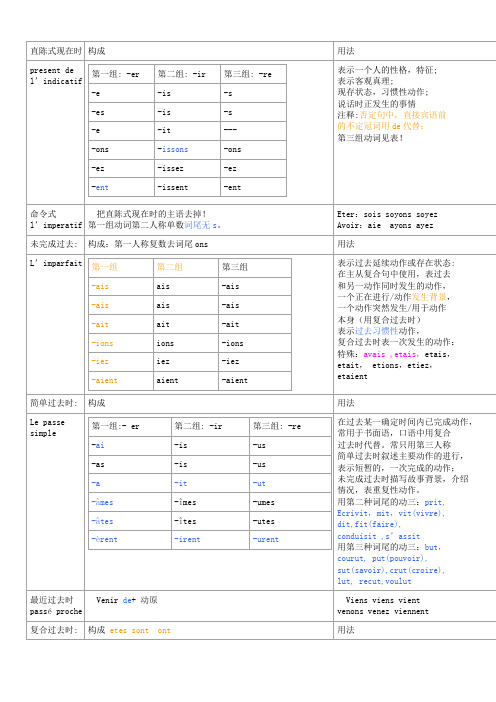
En+现在分词,无词形变化用作时间状语,表示在。
同时,强调同时性,还可在en前加副词tout做方式状语,条件状语;其主语只能是句子的主语动词不定式:做主语或逻辑主语;做宾语(直接跟在动词后,还是由介词a或de引导,取决于前面的动词);固定搭配中;构成省略疑问句;动词不定式现在时:表与主要动作(时间可为过去,现在,未来)同时或在它之后发生的动作动词不定式过去时:etre或avoir的不定式加动词的过去分词,与被动态的区别!表与主要动作(时间可为过去,现在,未来)相比.已经完成的动作Avant que在...之前/pour que为了/a condition que只要/bien que虽然/sans que无需/afin que以便/a moins que除非/qui que无论是谁/ou qu e/quoi que无论是什么/quel que无论什么样的被动态由助动词être加上主要动词的过去分词构成。
这时,被动态动词和时态要由助动词être的各种时态来表示。
被动态中,过去分词的性、数要与主语的性、数相一致。
在被动态中,通常要用施动者补语,来说明动词的施动者是什么。
这时,通常以介词par(强调动作)来引导施动者补语:在某些动词后,特别是一些表抽象概念或情感的动词后,可用de引导施动者补语,比如aimer, respecter, connaitre, comprendre, suivre, accompagner等;上下文意思明确时,施动者补语往往可以省略现在分词(participe présent)构成:去掉直陈式第一人称复数的词尾-ons,另加-ant 特殊情况:avoir-ayant etre-etant savoir-sachant用法:作定语,紧接在被修饰词之后,相当于qui+变位动词;相当于一个表原因或时间的状从;可做形容词使用,但有性数变化过去分词以avoir为助动词时,如直接宾语在动词前面时,过去分词的性数应与直宾一致。
法语时态总结

法语时态总结简单版时态分类:现在时le présent de l’indicatif将来时Le future de l’indicatif最近将来时Future proche简单将来时Future simple未完成过去时L’imparfait de l’indicatif复合过去时L e passé composé de l’indicatif被动态La forme passive一.现在时:描写发生的动作或状态/表达习惯性动作/描述真理例:j’écris un article Aimer FinirIl a m al à l’estomac J’aime Je finisMa mère va au bureau à 7h du matin Tu aimes Tu finisL’eau bout à 100°c Il/elle aime Il/elle finitJ’arrive tout de suit Nous aimons Nous finissonsVous aimez Vous finissezIls/elles aiment Ils/elles finissent 动词分组:第一组(-er) 第二组(-ir) 第三组(-re)二.简单将来时动词变化:以-rai -ras -ra -ra -rons -rez -ront -ront 结尾Etre AvoirJe serai J’auraiTu seras Tu aurasIl/elle sera Il/elle auraNous serons Nous auronsVous serez Vous aurezIls/elles seront Ils/elles auront例:Demain j’irai au cinéma.Elle sera ici demail.三.最近过去时四.最近将来时表示马上就要进行的动作Aller+动词原形表达刚刚结束的动作Venir de +动词原形Je vais aller au cinéma.我将要去电影院Je viens de partir.我刚刚走五.未完成过去时动词变化:以-ais -ais -ait -ait –ions- iez –aient –aient结尾表达过去描写的背景/ 环境/人物未完成过去时主要表达/描写/叙述/事情表达过去发生的习惯性动作Hier martin ,il faisait mauvais, le ciel était nuageux.昨天早上天气很坏,乌云密布Quand j’étais à Paris ,je me promenais tous les jours le long de la Seine.当我在巴黎的时候,每天我都去河边散步六.复合过去时表示已经结束的动作动词变化être(avoir)+过去分词Il est sorti 他出去了Elle a démenagé他已经搬家了Etre做助动词用于venir partir entrer montre desendre reste tombre sortir等注以se 形式的自反动词也用être做助动词剩下用avoir做助动词第一组动词将词尾-er换成-é parler parlé第二组动词将词尾-ir换成-i finir fini第三组动词有四种词尾:-i -u -s -t sortirrépondremettredire sortirépondumisdit有些第三组动词过去分词:avoir eu être été faire fait lire lu attendre attendu entendre entendu connaître connu vouloir voulu pouvoir pu savoir su voir vu boire bu falloir fallu pleuvoir plu prendre pris comprendre compris écrire écritBien, déjà, beaucoup, encore等副词放在助动词与过去分词之间。
法语时态复习概要

一、直陈式现在时二、最近将来时构成:aller+动词不定式意义:即将或很快就会发生的运作三、最近过去时构成:venir de + 动词不定式意义:表示比另一个过去的运作发生时间较晚的运作,"刚刚,才"四、直陈式复合过去时构成:助动词的直陈式现在时+ 动词的过去分词意义:表示过去已经完成的运作,其中的一些与现在有某种关联。
过去分词:1.第一组动词去掉词尾的-er加上-é,regarder – regardé2.第二组动词去掉词尾的-ir加上-i,finir – fini3.第三组动词是不规则的直陈式复合式的助动词有两个,avoir与être.*副词放在助动词与过去分词之间。
注意:1、以avoir做助动词的复合时态里,如果直接宾语人称代词提前,复合形式中的过去分词要与提前的直宾人称代词性、数一致。
2、部分动词过去时用avoir作助动词,但也有一些表示位置及状况变动的不及物动词在复合时态中用être作助动词。
所有的代词式动词均用être作助动词。
*用être作助动的动词:所有代词式动词、aller、sortir、partir、rentrer、retourner、revenir、venir、arriver、entrer、rester、devenir、tomber、naitre、monter、mourir、descendre3、用être作助动词的复合时态中,过去分词有性和数的变化,要和主语的性数相一致。
4、代词式动词的复合过去时有性数配合上有两种情况:当自反代词是直接宾语时,过去分词的性数要与自反人称代词一致。
(即主语)Nous nous sommes rencontrés hier soir.当自反代词是间接宾语时,过去分词不变。
Elles se sont lavéles mains.5、当泛指代词tout作直接宾语时,它位于助动词与过去分词之间。
法语时态总结表

法语时态总结表在学习法语的过程中,掌握时态是非常重要的一部分。
时态的正确使用能够帮助我们更准确地表达过去、现在和将来的动作和状态。
法语中共有九种时态,它们分别是:1. 现在时(Présent)现在时是最基本也是最常用的时态,用于描述现在正在进行的动作或者现在的状态。
例如:- Je mange.(我正在吃。
)- Elle est heureuse.(她很开心。
)2. 过去时(Passé composé)过去时用于描述已经发生的动作或者过去曾经存在过的状态。
它由助动词"avoir"或"être"和动词的过去分词构成。
例如:- J'ai fini mes devoirs.(我完成了我的作业。
)- Il est arrivé à l'heure.(他准时到达了。
)3. 未来时(Futur simple)未来时用于描述将要发生的动作或状态。
它通常由动词的原形与词尾组成。
例如:- Je partirai demain.(明天我将离开。
)- Nous jouerons au tennis ce soir.(我们今晚将打网球。
)4. 过去进行时(Imparfait)过去进行时用于描述过去某时正在进行的动作或状态,强调一个过去的常态或者某个过去的背景。
例如:- Quand j'étais petit, je jouais au parc tous les jours.(在我小的时候,我每天都在公园里玩。
)- Il lisait un livre pendant que je préparais le dîner.(当我准备晚餐的时候,他一直在读书。
)5. 过去完成时(Plus-que-parfait)过去完成时用于描述在过去某个时间点之前已经发生的动作或者状态。
法语时态
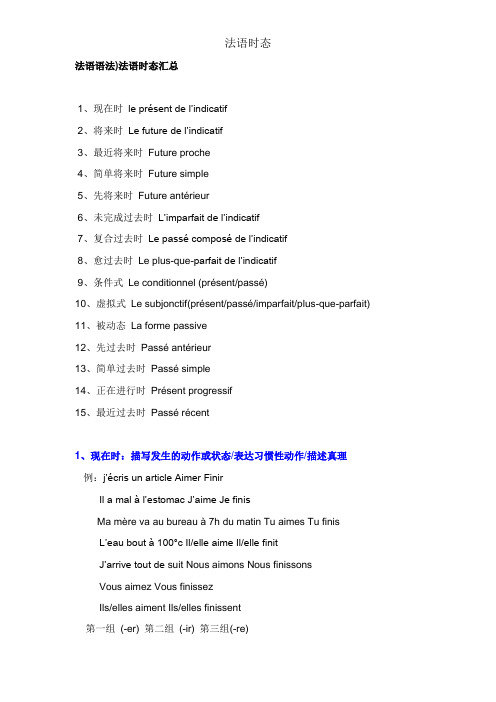
法语语法)法语时态汇总1、现在时le présent de l’indicatif2、将来时Le future de l’indicatif3、最近将来时Future proche4、简单将来时Future simple5、先将来时Future antérieur6、未完成过去时L’imparfait de l’indicatif7、复合过去时Le passé composé de l’indicatif8、愈过去时Le plus-que-parfait de l’indicatif9、条件式Le conditionnel (présent/passé)10、虚拟式Le subjonctif(présent/passé/imparfait/plus-que-parfait)11、被动态La forme passive12、先过去时Passé antérieur13、简单过去时Passé simple14、正在进行时Présent progressif15、最近过去时Passé récent1、现在时:描写发生的动作或状态/表达习惯性动作/描述真理例:j’écris un article Aimer FinirIl a mal à l’estomac J’aime Je finisMa mère va au bureau à 7h du matin Tu aimes Tu finis L’eau bout à 100°c Il/elle aime Il/elle finitJ’arrive tout de suit Nous aimons Nous finissonsVous aimez Vous finissezIls/elles aiment Ils/elles finissent第一组(-er) 第二组(-ir) 第三组(-re)2、简单将来时动词变化:以-rai -ras -ra -ra -rons -rez -ront -ront 结尾Etre AvoirJe serai J’auraiTu seras Tu aurasIl/elle sera Il/elle auraNous serons Nous auronsVous serez Vous aurezIls/elles seront Ils/elles auront例:Demain j’irai au cinéma.Elle sera ici demail.3、最近过去时venir de +faire(动词原型)表示刚刚结束或刚刚发生的动作,这里的venir失去了"去"的意思例如:Il vient d'etre dix heure. 刚刚10点Nous venons d'sortir de la classe.我们刚刚离开教室。
(完整版)法语时态总结表

表示在过去将来的某个时间点或某个动作发生之前发生并且已经结束的动作。
基本构成形式:同条件式过去时的形式相同
avoir或être的条件式现在时+过去分词
1.用在宾语从句的时间状语从句中,表示在宾语从句过去将来的某个动作之前已经发生并且结束了的动作,与过去将来时配合使用,主句用过去时态。
L'autre jour-là,elle m’a écrit qu’elle me téléphonerait dès qu’elle serait arrivée en Mauritanie.有一天,她写信告诉我;她一到毛里塔尼亚,就给我打电话。
法语基本语式如下:
复合过去时
未完成过去时
愈过去时
最近过去时现在时
简单过去时过去时
先过去时
过去最近过去时
过去将来时
过去最近将来时
过去先将来时
简单将来时
最近将来时
先将来时
现在时
现在时现在时过去时
过去时过去时愈过去时
定义
构成
用法
比较
直陈式现在时态
直陈式现在时
发生在现在的动作或存在的状态
1.第一组规则动词:去掉由原形动词的词根-er加下列词尾构成:
2.简单过去时表示纯粹过去的事情或动作,与现在没有联系;复合过去时表示的动作有时还和现在有联系。
简单过去时与未完成过去时:
1.两种时态常常配合使用,简单过去时叙述主要动作的进行,未完成过去时则描写故事背景,介绍情况等。
2.简单过去时表示短暂的一次完成的动作;未完成过去时表示习惯性的、重复的动作。
先过去时
3.愈过去时还可以表示习惯性的、重复发生的动作,不过,这一动作也仍然是在过去某一时刻之前发生并已结束了的。
法语时态总结

说明:最近过去将来时: 表示从“过去”的角度看, 说明:最近过去将来时:allait + inf. 表示从“过去”的角度看,即将 发生的动作 例如: 例如:Quand nous sommes entrés dans la classe, le cours allait commencer.
返回
过去时
返回
过去将来时的构成
过去将来时由动词简单将来时的词根加上未完成过去时的词尾 –ais, -ais, -ait, -ions, -iez, -aient 构成。例如: 构成。例如:
avoir (简单将来时:j’aurai ...) 简单将来时: ) être (简单将来时:je serai ...) 简单将来时: )
未完成过去时 (2)用法 )
◆用法(3点):表示在过去所发生的事情,这件事发生的时间不明确,或 在所指的过去的一段时间内延续或重复进行 A. 表示过去延续的动作或存在的状态(être, avoir); 表示过去延续的动作或存在的状态( ---- A cette époque-là, la vie était dure dans la région, les gens ne trouvaient pas de travail. B. 表示过去习惯性或重复性的动作; ---- L’an dernier, il quittait la maison à sept heurs et demie tous les matins. (虽然有明确的时间限制,但表示过去这段时间每天重复的动作) C. 在主从复合句中,表示过去和另外一个动作同时发生 —表示过去两个动作同时进行的动作,两个动词都用为完成过去时。 表示过去两个动作同时进行的动作,两个动词都用为完成过去时。 表示过去两个动作同时进行的动作 Je regardais la télévision, ma mère faisait la cuisine. —如果一个动作正在进行中,突然发生另外一个动作,那么前一个动作用未 完成过去时,突然发生的用复合过去时。 Quand ma mère est entrée, je regardais la télévision.
法语时态总结

法语时态总结1. 最近过去时上册188构成:venir de+ 动词原形Il vient de rentrer.Le cours vient de commencer.2. 最近将来时上册143构成:aller +动词原形Nous allons faire ces exercices.Il va être deux heures.3. 直陈式现在时上册80,上册159构成:--第一组动词e onses eze ent例子:parlerparle parlonsparles parlezparle parlent--第二组动词is issonsis iezit issent例子:finirfinis finissionsfinis finissezfinit finissent4. 复合过去时上册239,上册257构成:avoir / être +过去分词(表示位置移动的动词,及代词式动词用être)(注意代词式动作的构成形式)je me suis levé(e) nous nous sommes levés(es)tu t'es levé(e) vous vous êtes levé(e)(s)(es)il s'est levéils se sont levéselle s'est levée elles se sont levéestu ne t'es pas levé t'es-tu levé...?性数变化:用avoir的:一般没有性数变化;但是如果直接宾语在动词前面,则过去分词性数与直接宾语的一致--Vous avez reçu ma lettre?--Oui, je l'ai reçue. (宾语提前,过去分词性数与宾语一致)用être的:1)过去分词性数一般与主语一致;对于代动词,2)如果代动词表示直宾或自反或相互的相互意义,则性数与主语一致;3)如果代动词表示间接宾语,则过去分词性数没有性数变化1) Hier, Marie est allée àla campagne. (非代动词,过去分词性数与主语一致)2) Elles se sont lavées àl'eau chaude. (代动词,表自反,过去分词性数与主语一致)3) Nous nous sommes parléen français. (代动词,间宾,过去分词性数无变化)用法:表示过去发生的动作,或从现在的角度看,已经完成的动作J'ai fini mon travail.J'ai parléàPierre ce matin.5. 未完成过去时上册310构成:现在时第一人称复数去掉-ons,再加-ais -ions-ais -iez-ait -aient用法:表示在所谈到时间段一直延续进行的动作;表示习惯性或重复性的动作;复合句中,表示一个动作正在进行(未完成过去时),另一动作突然发生(复合过去时);描述背景A cette époque-là, la vie était très dure dans cette région, les gens ne tro uvaient pas de travail.Chaque étéil retournait àShanghai.Il lisait les journaux quand je suis entré.La semaine dernière, c'étais la fête du printemps.6. 简单将来时上册385构成:第一,第二组动词原形+词尾:-ai -ons-as -ez-a -ont用法:表达将来发生的动作或出现的状态Il fera beau demain.Nous partirons le mois prochain.7. 先将来时上册386构成:avoir/être 的简单将来时+过去分词用法:表示在另一个将来的动作发生之前已经完成的动作Je rentrai chez moi quand j'aurai fini ce travail.Dès que nous serons arrivés àParis, nous vous écrirons.8. 过去将来时上册404构成:简单将来时词根+未完成过去时词尾j'aurais nous aurionstu aurais vous auriezil/elle aurait ils/elles auraient用法:当主句动词表示过去时态时,从句用过去将来时表示主句动作之后将要发生的动作Pierre m'a dit qu'il rendrait visite àson professeur.9. 愈过去时下册7构成:avoir/être 的未完成过去时+过去分词用法:表示在过去某时已经发生或完成的动作。
法语时态复习

1.最近将来时•aller +inf (马上,很快要去做什么)多用于口语中。
•Je vais lui téléphoner.•Il va revenir.2.简单将来时(le future simple)forme:规则动词在动词原形后直接加下列词尾:-ai -as -a -ons -ez -ont2.用法:简单将来时表示将要发生的动作或在未来的一段时间内存在的状态。
Nous serons en vacances dans trois mois.【Il ira en France après ses études.3.先将来时(le future antérieur)La forme:先将来时是一种复合时态,由助动词avoir或être的简单将来时加动词的过去分词构成。
j’aurai parléje serai parti用法:先将来时是一个完成时态,用于表示在另一个将来的动作发生之前已经完成的动作。
常用于quand, lorsque, dès que 等时间状语从句中:Tu me donneras cette fiche quand tu l’aurasremplie.Dès que je serai arrivéàl’aéroport, je prendrai une voiture .Quand j’aurai lu le journal, je te le donnerai.J’aurai fini mon rapport avant 17 heures.\现将来时也可以用在独立句中,表示在一个限定的时间前必须完成的动作。
Elle sera venue àce samedi.Nous aurons visitéla Tour Eiffel avant la fin de la semaine.4.过去将来时(le futur dans le passé)1构成:过去将来时由动词简单将来时的词根加上未完成过去时的词尾–ais, -ais, -ait, ait,-ions,-iez, aient2表示从过去的角度看将要发生的动作。
- 1、下载文档前请自行甄别文档内容的完整性,平台不提供额外的编辑、内容补充、找答案等附加服务。
- 2、"仅部分预览"的文档,不可在线预览部分如存在完整性等问题,可反馈申请退款(可完整预览的文档不适用该条件!)。
- 3、如文档侵犯您的权益,请联系客服反馈,我们会尽快为您处理(人工客服工作时间:9:00-18:30)。
1.最近将来时•aller +inf (马上,很快要去做什么)多用于口语中。
•Je vais lui téléphoner.•Il va revenir.2.简单将来时(le future simple)forme:规则动词在动词原形后直接加下列词尾:-ai -as -a -ons -ez -ont2.用法:简单将来时表示将要发生的动作或在未来的一段时间内存在的状态。
Nous serons en vacances dans trois mois.Il ira en France après ses études.3.先将来时(le future antérieur)La forme:先将来时是一种复合时态,由助动词avoir或être的简单将来时加动词的过去分词构成。
j’aurai parlé je serai parti用法:先将来时是一个完成时态,用于表示在另一个将来的动作发生之前已经完成的动作。
常用于quand, lorsque, dès que 等时间状语从句中:Tu me donneras cette fiche quand tu l’aurasremplie.Dès que je serai arrivéà l’aéroport, je prendrai une voiture .Quand j’aurai lu le journal, je te le donnerai.J’aurai fini mon rapport avant 17 heures.现将来时也可以用在独立句中,表示在一个限定的时间前必须完成的动作。
Elle sera venue à ce samedi.Nous aurons visité la Tour Eiffel avant la fin de la semaine.4.过去将来时(le futur dans le passé)1构成:过去将来时由动词简单将来时的词根加上未完成过去时的词尾–ais, -ais, -ait, ait,-ions,-iez, aient2表示从过去的角度看将要发生的动作。
过去将来时多用在补语从句中,主句的时态用过去时。
Il m’a dit qu’il viendrait le lendemain.Elle nous a promis qu’elle viendrait chez nous une semaine apr ès.5.最近过去时•venir de +inf (刚刚做完,才怎样)•Il vient de finir son travail.•Nous venons de prendre le déjeuner.6.复合过去时avoir/être +participé passé复合过去时表示过去发生的动作,或从现在角度看,已经完成的动作。
复合过去时配合问题:以avoir为助动词的,只和直接宾语进行性数的配合。
以être为助动词的,部分不及物动词和主语进行性数的配合,自反式代动词和直接宾语配合。
Hier, j’ai rencontré un camarade.Est-ce que tu as fini tes devoirsOui, je les ai déjà finis.Elle est partie.Les filles sont rentrées chez elles.Ce matin, je me suis levé trop tard.Les enfants se sont lavé la main avant le repas.7. 未完成过去时Habiter nous habitons-ais, -ais, -ait, -ait, -ions, -iez, aient, aientJ’habitais nous habitionsTu habitais vous habitiezIl /elle habitait ils/elles habitaient1) 表示过去延续或存在的动作,这类动作开始和结束的时间都不明确,也就是说这个动作曾经持续过一段时间Avant, il habitait à la campagne.Monsieur. Andrieu était ouvrier.2)表示过去习惯性或重复性的动作Quand j’étais petit, j’allais tous les ans passer mes vacances à la campagne.3)用于主从复合句,表示过去和另一动作同时发生的动作,其中一个动作正在进行,另一个发生并完成。
Le professeur est entrédans la classe pendant que nous chantions et dansions.4)未完成过去时用于描写在文学作品中未完成过去时常常用来进行描写,描述人物,环境,气氛等。
La neige couvrait la terre.Les enfants couraient, criaient, et sautaient sous le beau soleil du printemps.8. 简单过去时1.第一种类型的词尾适用于全部以-er结尾的动词,包括aller在内。
commencer je commençai, il commençamanger je mangeai, il mangeacréer je créai, il créaaller j'allai, il alla1.第二种类型的词尾用于(1)以-ir 结尾的动词(courir, mourir, venir除外)ex:ouvrir j'ouvris, il ouvrit(2)与répondre同类型的第三组动词(rendre, mordre)ex: répondre je répondis, il répondit(3)不规则动词这一类动词的简单过去时中的词根略有改变。
ex: atteindre j'atteignis, il atteignitnaître je naquis, il naquitvaincre je vainquis, il vainquit3. 第三种类型的词尾适用于其余不规则动词。
ses emploisl'homme fut l'euvre du sixième jour de Dieu.Il se leva, prit son manteau, ouvrit la porte et disparut dans la nuit.9. 愈过去式La forme:助动词的未完成过去时+动词的过去分词(avais/étais+participe)L’emploi:愈过去时表示在另一个过去动作之前已经完成了的动作,多用于主从复合句中。
Il est sorti de la bibli othèque quand il avait fini ses devoirs. Il a réussi son examen, parce qu’il avait bien révisé ses leçons.10. 先过去时(le passé antérieur)Avoir/être(简单过去时)+ participe passéL’emploi先过去时表示在简单过去时之间已经发生并完成的动作,且两个动作紧密相连。
通常用在dès que, aussitôt que, à peine que等短语引导的时间状语从句中。
Dès qu’il eut fini s on travail, il aida les autres.Aussitôt qu’il fut parti, le directeur lui téléphona.11. 最近过去将来时Allait + infinitif练习题:1.J’essayais de t’appeler plusieurs fois ce matin, mais ou bien ç ane répondait, ou bien c’était occupé. Qu’est-ce qui te ( arriver )_________2.Vendredi dernier, j’ai entendu dire que les représentants de Shanghaiparticipant au Salon d’Autos( partir )________pour Beijing la veille.3.Passionné dès son enfance pour le théâtre et le cinéma, la jeune filleest sûre qu’un jour , elle (devenir)________ une actrice célèbre.4.(se lever )_________de bonne heure demain matin, sinon tu manquerrasle train qui part à sept heures et demie à la gare de Montparnasse.5.Hier soir, quand mon ancien collègue de retour à Paris m’a téléphoné,je (être)______ dans la salle de bains et je n’ai pas répondu.6.Le ciel (être)________gris, il (pleuvoir)__________. Tout à coup levent(se lever)____________et (chasser)___________les nuages. Le soleil (apparaître)___________.7.Duroc se rendit compte qu’il (oublier)_______________sonportefeuille.8.Il rencontra qu’il (connaître)__________à Lyon.9.Elle a dit aux enfants que je les (emmener)________au zoo le lendemain.10.Quand il tournait la clédans la serrure, le téléphone(commencer)________à sonner.11.Ce produit (lancer)________su r le marché il y a 6 mois.12.Aussitôt qu’il (passer)_______son permis, son père lui prêtera savoiture.13.Ils sont partis faire le tour du monde, mais bien sûr,ils(s’organiser bien)________avant leur départ.urent m’a promis que sa femme nous (téléphoner)__________dès sonarrivée en Chine.15.Tout de suite après que nous (revenir) ________________de vacances,nous vous téléphonerons.16.Elle ne pourra pas participer à la réunion des locataires de cetimmeuble, parce qu’elle(ne pas rentrer)_____________.17.Quand il a disparu dans la foule, je (l’apercevoir déjà)___________.18.Les Jeux Olympiques de 2008(avoir lieu)___________à Beijing et àQingsdao.19.Quand il est entré dans la salle d’études, nous (faire)_________nosétudes.20.Hier, quand je suis rentré chez moi, mon frère (aller) ___________sortir.21.Cet automne-là, il (pleuvoir beaucoup) ______________ à Nancy.22.Quand tu auras terminé de lire ce journal, tu (pouvoir)________m’aider à traduire cette lettre en français.23.Un incendie a détruit le magasin. Il (allumer)l ____________par unclient imprudent. semaine dernière, notre professeur nous a annoncé qu’il(partir)____________en mission dès qu’il (terminer)___________ la traduction.25.Nous (finir)_____________le travail avant midi, c’est sûr.26.Hier soir, mon ami (chanter)____________des chansons français dansla chambre pendant que je (lire)______________mes devoirs.27.Q uand l’orateur (obtenir)______________le silence, il commenç a sondiscours.28.L a mère a raconté que son enfant(mordre) ________________par un chienenragé.29.A près qu’un homme (perdre)_____________tout, il lui teste encore del’espoir.30.L’année dernière, quand il (prendre)___________le dîner, il allaitfaire un tour dans le bois.。
